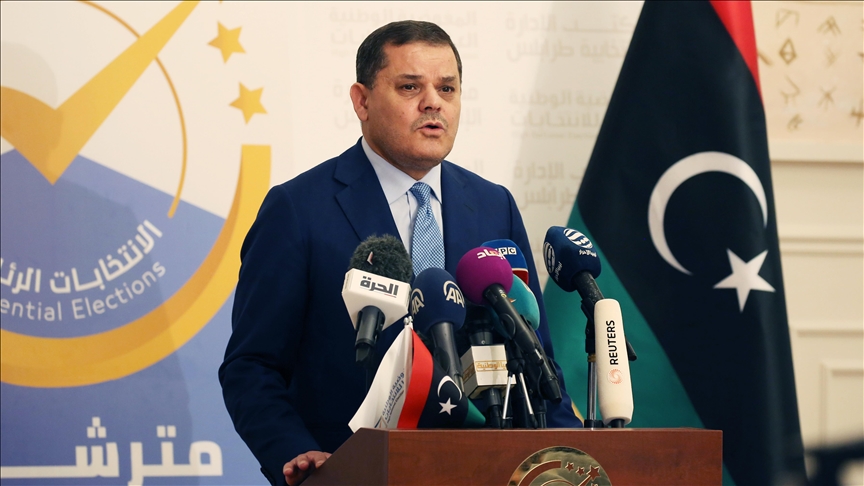Today, Wednesday, a Libyan parliamentary committee confirmed the impossibility of holding the presidential elections that were scheduled for the day after tomorrow. On the other hand, Abdel Hamid al-Dabaiba resumed his duties as head of the government after he stopped practicing it as a result of his candidacy for the presidential race.
Reuters reported that the High National Elections Commission had proposed postponing the first round of elections to January 24.
The Libyan House of Representatives' Follow-up Committee on Presidential and Parliamentary Elections confirmed today the "impossibility" of holding the presidential elections on their scheduled date, Friday.
Earlier, the head of the Electoral Commission, Imad al-Sayeh, decided to dissolve the electoral committees throughout the country and end their work due to the failure to hold the elections on time.
"Based on the meetings and meetings with the Electoral Commission, the Supreme Judicial Council, and all concerned parties, and after reviewing the technical, judicial and security reports, we inform you of the impossibility of holding the elections on the scheduled date of December 24," said Committee Chairman Al-Hadi Al-Saghir.
The inability to hold the elections was "expected" due to the failure to publish the final lists of candidates, in addition to not allowing the launch of electoral campaigns, and the judicial problems that accompanied the appeals process against the candidates.
The government continues
In the same context, a government source announced today, Dabaiba, the return of his duties as prime minister, after he stopped running for the presidential elections, which were postponed.
This source said that Dabaiba began his duties on Tuesday evening.
He added, "The government has the legal right to continue performing its duties due to the postponement of the elections, and Dabaiba's return to work does not violate the agreement of the Political Dialogue Forum."
He also pointed out that the life of the government agreed upon in the political dialogue forum is 18 months, and that power must be handed over to a government elected by the people.
It is noteworthy that in October of last year, a ceasefire was signed between the two competing camps in the east and west of the country.
This was followed by the formation of a new unified government at the beginning of 2021 to manage the transitional period, and to organize presidential and then parliamentary elections.
The government includes 32 ministers, including 6 "state ministers" without portfolio, and 5 women ministers, in addition to the prime minister who holds the Ministry of Defense, and his two deputies.
Libyans hope that these elections will contribute to ending the armed conflict that erupted after the fall of Omar Gaddafi following a popular revolution in 2011.
In conjunction with these developments, Presidential Council Chairman Mohamed El Manfi discussed with Egyptian President Abdel Fattah El Sisi the political developments in the country.
A statement by the Egyptian presidency said that Sisi affirmed Cairo's support for all that achieves the supreme interest of Libya, and preserves the unity and sovereignty of its territory.
The statement added that it was agreed to intensify consultation and coordination between the two sides during the coming period, to follow up on developments in the political process and procedures for managing the transitional phase.
Military reinforcements
On the other hand, a military force deployed in the southern suburbs of the capital, Tripoli, following disputes between armed brigades over a security headquarters in the Ain Zara area, a matter described by the United Nations mission as a source of tension and clashes.
And local media reported that military reinforcements arrived in Tripoli from the city of Zintan (southwest) following security tensions and the spread of armed factions inside the capital.
Video clips, published by media pages on Facebook, showed the influx of military vehicles carrying fighters and light and medium weapons.
Meanwhile, the United Nations Support Mission in Libya expressed its concern about the ongoing security developments in Tripoli, stressing that the movements of forces affiliated with different groups lead to a state of tension, and enhance the risk of clashes that may turn into conflict.
In a statement, the UN mission called on all Libyan actors to exercise restraint and work to create a security and political climate that would enable the holding of sound elections and a successful transition process.
She stressed that any differences on political or military issues must be resolved through dialogue, especially at this stage in which the country is going through an electoral process that is hoped to lead to a peaceful transition.
The UN mission said that the current developments in Tripoli are inconsistent with the ongoing efforts to maintain stability and create security and political conditions conducive to holding peaceful, inclusive, free, fair and credible elections.
For its part, the US Embassy in Libya confirmed Washington's encouragement for all steps to calm the tense security situation in Tripoli and throughout Libya.
"All legal and political obstacles to holding the Libyan elections must be urgently addressed," she said.
The Prime Minister of the National Unity Government welcomed the efforts to end the state of tension in the capital, stressing that bloodshed is a red line.

